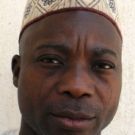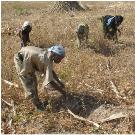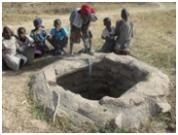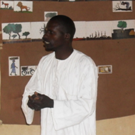Suleiman Barau Kadana works for People Oriented Development of ECWA as a facilitator and training officer in northern Nigeria.
 |
He is working with 257 men, women and children, in the village of Gidan Gyarai, near Kadana, Nigeria who are suffering from deficient food security and low crop yields caused by a scarcity of rain, poor agricultural water management, climate change related reduction in surface water, increase in temperature, and a sudden change in weather conditions. |
They are also suffering from the effects of deforestation caused by indiscriminate tree logging, land clearing and improper farm encroachment. These challenges lead to increased poverty, increased water and wind erosion, a decrease in soil fertility, increased fertilizer use, destruction of ecosystems, and decreased unity in the community.
 |
Sule has developed a project designed to address these challenges that includes a family garden and nutrition program, a climate smart agricultural program, and a forest management program—download an outline of his report. |
Sule is just finishing his second course at CSDi—he has one more assignment to turn in and he has just written:
“Regarding my week six assignment: due to tension we are experiencing in Northern Nigeria that is the main reason why I am unable to get it done, for some days we have had to stay away from our houses for safety, please pray for Christians in Northern Nigeria. Finally, will you be willing to extend some time for me to get the assignment to you?”
 |
Kadana, in Northern Nigeria, was the location of the bombings of Christian churches by the Boko Haram on Sunday the 17th of June where 50 people died at three different churches. The group, whose name means “Western education is forbidden,” has referred to itself as the “Nigerian Taliban.” It seeks to overthrow the government. |
Other students have faced similar challenges in Somalia, South Sudan, Sudan, and Darfur. Because of extreme security measures, students working in these countries frequently have difficulty getting to their communities—and are not allowed to take or send photographs of their projects.
 |
Students working on humanitarian projects also face grave danger in the face of hurricanes and floods—notably in Pakistan and Bangladesh. 220 million people were put at great risk in 2010 during floods in Pakistan; floods returned again in 2011 leaving 200,000 homeless. |
I’m impressed that professional field staff working under these conditions and taking our courses continue to develop their projects, send in reports, assignments and sign up for new courses. I stand in awe of their bravery and perseverance. Thank you for including us in your lives.
Would you like to learn how to develop Community Based Adaptation Projects?
What’s happening in the region where you live?
Please write us with your stories, thoughts and comments through Online.Learning@csd-i.org
Please write us with your stories, thoughts and comments through Online.Learning@csd-i.org
I look forward to hearing from you.
Sincerely,
Tim Magee, Executive Director
Would you like to subscribe to this newsletter?
The Center for Sustainable Development specializes in providing sound, evidence-based information, tools and training for humanitarian development professionals worldwide. CSDi is a 501(c)(3) nonprofit organization.